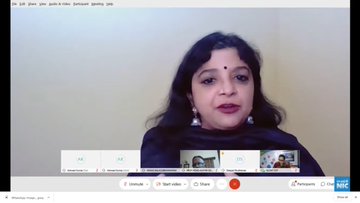Webinar on “Faculty Development for Quality Education” under Shikshak Parv Initiative
New Delhi: The Ministry of Education organized a webinar on Faculty Development for Quality Educationon 15th September, 2020 under Shikshak Parv Initiative. The webinar was organised with the objective to reflect on the roles and responsibilities of teachers in the light of NEP and to understand various aspects of capacity development and career progression of the faculty.Shikshak Parv is being celebrated by Ministryof Education from 8th September- 25th September, 2020 to felicitate the Teachers and to take New Education Policy 2020 forward.
Professor J. S. Rajput,India’s Representative on the ExecutiveBoard of the UNESCO, Prof. N.V. Varghese, Vice Chancellor, NIEPA, Prof. A.C. Pandey, Director, IUAC and Dr. Geeta Bhatt, Associate Professor, University of Delhi were the guest speakers in the session of Higher Education. Dr. Archana Thakur, Joint Secretary, UGC moderated the session.
India is now determined to create a pool of teachers who would not only be degree-holders; but ‘persons’ who would possess ‘personalities’ said Prof. J.S. Rajput. He added that the new approach to teacher preparation would expect every teacher to develop a comprehensive perspective towards life and living. He further said that teachers would internalize the higher goals of education, appreciate the measure of responsibility entrusted by the nation, society and community, to prepare a new confident generation, professionals who understand India, its ethos, its culture, history and heritage; as also its emerging role in the globalized world.
Prof. N.V. Varghese emphasised that teachers in higher education need to be supported rather than trained. Higher education needs more research in pedagogy. PMMMNMTT is a good initiative by the Ministry of Education, he added. He also stressed upon academic freedom and autonomy with safeguardsand modified means of student’s engagement.
Prof. Pandey emphasized synergistic role of science and society and how education willinfluence sustainable development goals. In the COVID era blended mode of teaching learning has replaced brick and mortar classrooms. There should be appropriate integration of technology into all levels of education to improve classroom process support, he added.
The NEP-2020 took care to give freedom to teachers/faculty with right teaching material, pedagogy for delivering quality education incentives in terms of promotions, awards etcand, teachers have to be like catalyst, said Dr. Geeta Bhatt. They have to be competitive, proactive for global challenges, she added. Dr. Archana Thakur lauded the role of PMMMNMTT, Ministry of Education and UGC-HRDC in implementation of faculty development programmes and NEP 2020 for far-reaching changes in higher education.
In the session organized by the Department of School Education and Literacy The expert speakers were Prof. M.A. Siddiqui, Former Chairman NCTE, Prof. Ranjana Arora, Head, Dept. of Teacher Education, NCERT, and Ms. Manju Balasubramanyam Principal, Delhi Public School, Bengaluru. The beneficiary group for this session are Teacher Education Institutions, Teachers Educators, Teacher, Aspiring Teacher and School Education Department in all States/UTs.
The session started with a general presentation of the major recommendations of the NEP 2020 on Teachers and Faculty Development followed by a presentation made by Prof. Ranjana Arora. She said that for the first time, Teachers have been accorded special status by the NEP 2020 by acknowledging the high respect for teachers and the high status of the teaching profession. The need of the hour now is mass education and orientation of the teachers and teacher educators on the recommendations of the NEP 2020.A detailed Programme of Action (POA) needs to be developed for implementation of the NEP 2020 which would have action points listed out for various stakeholders within a specified time frame. The scope for evaluation of these action points could also be listed out in the POA.
Prof. M.A. Siddiqui highlighted the need for strengthening the Teacher recruitment and deployment system has been recognized through adoption of an online computerized system for transfer that ensures transparency. More empowerment to teachers through assessment of performance of teachers will be based on peer reviews, attendance, commitment, hours of CPD, and other forms of service to the school and the community, he added. Prof Siddiqui also said that NEP has ensured decent and pleasant service conditions at schools, rationalization of schools, without in any way reducing accessibility, for effective school governance, resource sharing, and community building and teachers will not be engaged any longer in work that is not directly related to teaching.
Considering the fact that proportion of participation of the private sector in Teacher Education is very high i.e., about 92%, enhancing the presence of the Government sector in Teacher Education is very important,Ms. Manju Balasubramanyam said. Strengthening and extending TET to cover all stages of School Education is a welcome step, she said. In addition to TET, personal interviews could also be considered a requisitefor entering the Teaching profession, she added.

